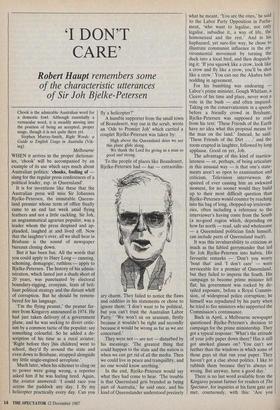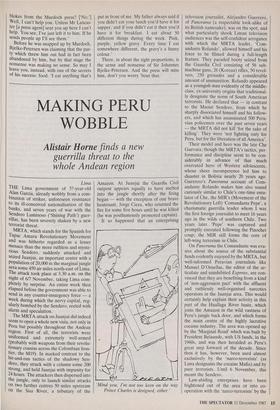`I DON'T CARE'
Robert Haupt remembers some
of the characteristic utterances of Sir Joh Bjelke-Petersen
Chook is the admirable Australian word for a domestic fowl. Although essentially a vernacular word, it is steadily moving into the position of being an accepted, proper usage, though it is not quite there yet.
Stephen Murray-Smith, Right Words: a Guide to English Usage in Australia (Vik- ing). Melbourne WHEN it arrives in the proper dictionar- ies, `chook' will be accompanied by an example of its use which says much about Australian politics: `choolts, feeding of slang for the regular press conferences of a political leader, esp. in Queensland'.
It is for inventions like these that the Australian press will miss Sir Johannes Bjelke-Petersen, the inimitable Queens- land premier whose term of office finally came to an end last week amid flying feathers and not a little cackling. Sir Joh, an ungrammatical agrarian populist, was a leader whom the press despised and ap- plauded, laughed at and lived off. Now that the laughter's over, all we shall hear in Brisbane is the sound of newspaper bureaux closing down.
But it has been fun. All the words that you could apply to Huey Long — cunning, scheming, demagogic, ruthless — apply to Bjelke-Petersen. The history of his admin- istration, which lasted just a shade short of 20 years, was punctuated by electoral boundary-rigging, cronyism, feats of bril- liant political strategy and the distant whiff of corruption. But he should be remem- bered for his language.
`I'm the flying peanut,' the peanut far- mer from Kingaroy announced in 1974. He had just taken delivery of a government plane, and he was seeking to divert critic- ism by a common tactic of the populist: say something colourful. So he added a de- scription of his time as a rural aviator: `Right before they [his children] went to school, they'd fly around the state and even down to Brisbane, strapped alongside my little single-engined aeroplane.'
Much later, when his schemes to cling on to power were going wrong, a reporter asked him if he was feeling tired. Again, the aviator answered: 'I could race you across the paddock any day. I fly my helicopter practically every day. Can you fly a helicopter?'
A humble supporter from the small town of Beaudesert, way out in the scrub, wrote an 'Ode to Premier Joh' which carried a couplet Bjelke-Petersen was taken by: High above the Queensland skies we see this plane glide along.
We thank the Lord for giving us a man so good and strong.
To the people of places like Beaudesert, Bjelke-Petersen had — has — extraordin- ary charm. They failed to notice the flaws and oddities in his statements or chose to ignore them: 'I don't want to be political, but you can't trust the Australian Labor Party.' We won't sit on uranium, firstly because it wouldn't be right and secondly because it would be wrong as far as we are concerned.'
They were not — are not — disturbed by his meanings: 'The greatest thing that could happen to the state and the nation is when we can get rid of all the media. Then we could live in peace and tranquillity, and no one would know anything.'
In the end, Bjelke-Petersen would say what they had come to hear. 'The trouble is that Queensland gets branded as being part of Australia,' he said once, and his kind of Queenslander understood precisely what he meant. 'You are the ones,' he said to the Labor Party Opposition in Parlia- ment, 'who want to legalise, not only legalise, subsidise it, a way of life, the homosexual and the rest.' And in his haphazard, yet sure-fire way, he chose to illustrate communist influence in the en- vironmental movement by turning the duck into a local bird, and then despatch- ing it: 'If you squawk like a crow, look like a crow and fly like a crow, you'll be shot like a crow.' You can see the Akubra hats nodding in agreement.
For his bumbling was endearing Labor's prime minister, Gough Whitlam, a Cicero of his time and place, never won a vote in the bush — and often inspired. Taking on the conservationists in a speech before a friendly crowd in Brisbane, Bjelke-Petersen was supposed to read from his text: 'These Friends of the Earth have no idea what this proposal means to the man on the land.' Instead, he said: `These Friends of the Dirt . . .' and the room erupted in laughter, followed by long applause. Good on yer, Joh.
The advantage of this kind of inarticu- lateness — or, perhaps, of being articulate in this unusual way — is that one's state- ments aren't so open to examination and criticism. Television interviewers de- spaired of ever causing him an awkward moment, for no sooner would they build up to their most difficult question than Bjelke-Petersen would counter by reaching into his bag of long, chopped-up irrelevan- cies, often including a reference to the interviewer's having come from the South (a no-good region which, depending on how far north — read, safe and wholesome — a Queensland politician finds himself, can include parts of Queensland itself).
It was this invulnerability to criticism as much as the fabled gerrymander that led Sir Joh Bjelke-Petersen into hubris. His favourite remarks — 'Don't you worry 'bout that' and 'I don't care' — were serviceable for a premier of Queensland, but they failed to impress the South. His campaign to become prime minister fell flat; his government was rocked by de- tailed exposure, before a Royal Commis- sion, of widespread police corruption; he himself was repudiated by his party when he tried to fire ministers who supported the Commission's continuance.
Back in April, a Melbourne newspaper questioned Bjelke-Petersen's decision to campaign for the prime ministership. They got a typical response: 'What's the attitude of your jolly paper down there? Has it still got smoked glasses on? You can't see further than the windows in which some of those guys sit that run your paper. They haven't got a clue about politics. I like to rubbish them because they're always so wrong. But anyway, have a good day.'
There is no last word available from the Kingaroy peanut farmer for readers of The Spectator, for inquiries at his farm gate are met, courteously, with this: 'Are you blokes from the Murdoch press? [No.'] Well, I can't help you. Unless Mr Lancas- ter [a press agent] sent you up here I can't help. You see, I've just left it to him. If he sends people up I'll see them.' Before he was snapped up by Murdoch, Bjelke-Petersen was claiming that the par- ty which threw him out had in fact been abandoned by him, but by that stage the nonsense was making no sense. So may I leave you, instead, with one of the secrets of his success: food. 'I eat anything that's put in front of me. My father always said if you didn't eat your lunch you'd have it for supper, and if you didn't eat it then you'd have it for breakfast. I eat about 50 different things during the week. Pink, purple, yellow gravy. Every time I eat somewhere different, the gravy's a funny colour.'
There, in about the right proportions, is the sense and nonsense of Sir Johannes Bjelke-Petersen. And the press will miss him, don't you worry 'bout that.



























































 Previous page
Previous page